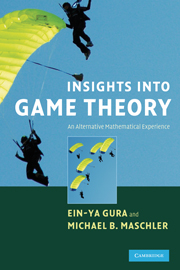4 - Analysis of a Bankruptcy Problem from the Talmud
Published online by Cambridge University Press: 04 June 2010
Summary
INTRODUCTION
Many times one encounters a bankruptcy situation where there are claims against a given estate and the sum of the claims against the estate exceeds its worth. In such situations one would like to know what would be a “fair” way of dividing the estate among the claimants.
Unfortunately, there is no clear-cut answer to this question. What seems fair in one case may seem less so in another. In this chapter we shall encounter several solutions, each shedding light on the “real world” and each applicable under certain circumstances.
We start with a curious method of division that has its origin in the Talmud, which represents still another fair division. It involves a man who married three women and promised them in their marriage contract the sums of 100, 200, and 300 units of money to be given to them upon his death. The man died but his estate amounted to less than 600 units. The Mishna, attributed to Rabbi Nathan (tractate Ketubot 93a), treats the cases in which the estate was worth 100, 200, and 300 units of money.
Information
- Type
- Chapter
- Information
- Insights into Game TheoryAn Alternative Mathematical Experience, pp. 166 - 204Publisher: Cambridge University PressPrint publication year: 2008
